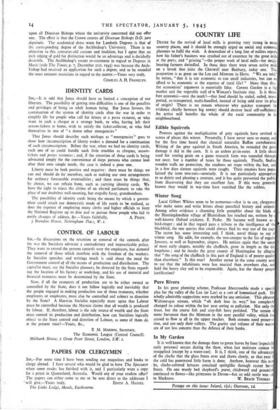COUNTRY LIFE
DESIRE for the revival of local mills is growing very strong in many country places, and it should be strongly urged on social and economic planners to fulfil the wish. A descendant of a long line of millers reports how his father's business was crushed out of existence by the great mills at the ports, and " gristing "—the proper work of local mills—for neigh- bouring farmers dwindled. In those days there were seven active mills on a brook that joins the Cherwell near Banbury, today one. This proportion is as great on the Lea and Mimram in Herts. "We are told," he writes, " that it is not economic to run small industries, but can we afford to be economic at the expense of rural life? " More than this: the economists' argument is essentially false. Covent Garden is a big market and the vegetable stall of *a Women's Institute tiny. Is it there- fore economic—save the mark !—that food should be staled, soiled, trans- ported, re-transported, multi-handled, instead of being sold near its place of origin? There is no reason whatever why quicker transport (in evidence chiefly between big towns) should destroy local self-sufficiency. An active mill benefits the whole of the rural community in its neighbourhood.
Edible Squirrels Protests against the multiplication of grey squirrels have revived in scores of places this winter. Personally, I have never seen so many, and for the first time heard that classical naturalist Buffon corroborated. Writing of the grey squirrel in South America, he recorded the great damage it did in the corn. It is an ardent grain-eater. A little shack used for storing grain on a game research farm was tunneled through not once, but a number of times by these squirrels. Finally, finding wooden walls no protection, the students set traps within the hut, and in a few days sixteen squirrels were caught. Their enemies have popu- larised the term tree-rats—unwisely. It is not particularly appropriate to so dainty and pleasing a creature, and it has quite prevented the public from discovering that they are excellent fare. If this were generally known they would in war-time have vanished like the rabbits.
Winter Song Local Gilbert Whites seem to be numerous—that is to say, clergymen who make notes and write letters about parochial history and animals. Among other evidence a charming little pamphlet about the birds of the Huntingdonshire village of Bluntisham has reached me, written by a well-known Oxford cricketer, E. Peake. He became well known as a bird-ringer ; and in that regard pays a tribute to the intelligence of the blackbird, the one species that could always find its way out of the cage, The rector has some interesting and, I think, novel things to say of winter song He adds, for example, the tree-creeper to the list of regulit January, as well as September, singers. He notices again that the songs of most early singers, notably the chaffinch, grow in length as the day lengthens ; and he insults the great county of Huntingdon by alleging that " the song of the chaffinch in this part of England is of poorer quality than elsewhere." Is this true? Another rector in the same county used to say that the inhabitants were less musical than anywhere else, and held the heavy clay soil to be responsible. Again, has the theory prop/ justification?
Pure Rivers In his great planning scheme, Professor Abercrombie made a special plea for the valley of the Lea (or Lee) as a sort of humanised park. His wholly admirable suggestions were marked by one omission. This pleasant Waltonesque stream, which "oft doth lose its way," has completely changed its colour within the last year owing to pollution. Not only the trout, but the coarse fish and tray-fish have perished. The stream is more fortunate than the Mimram in the next parallel valley, which ha ceased to flow at all in the upper reaches. Both streams need preserva- tion, and not only their valleys. The ..purity and volume of their waten are of not less concern than the defence of their banks.
In My Garden It is well known that the damage done to green leaves by frost (especiall early potatoes) occurs during the thaw, when lost moisture cannot be resupplied (except by a water-can). It is, I think, one of the advantages of the cloche that the glass frosts over and thaws slowly, so that even if the cold has penetrated little harm is done. Anyhow, however this may be, cloche-coVered lettuces remained springlike through recent hens; frosts. On one weedy bed shepherd's purse, chickweed and grounds• continued to flower—like primroses in Devon—but an odd nettle was c
Postage on this issue: Inland, aid.; Overseas, ad.


























 Previous page
Previous page